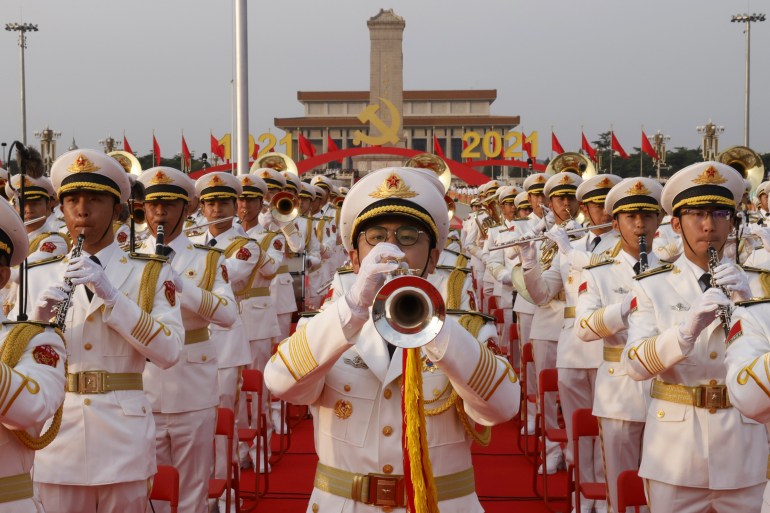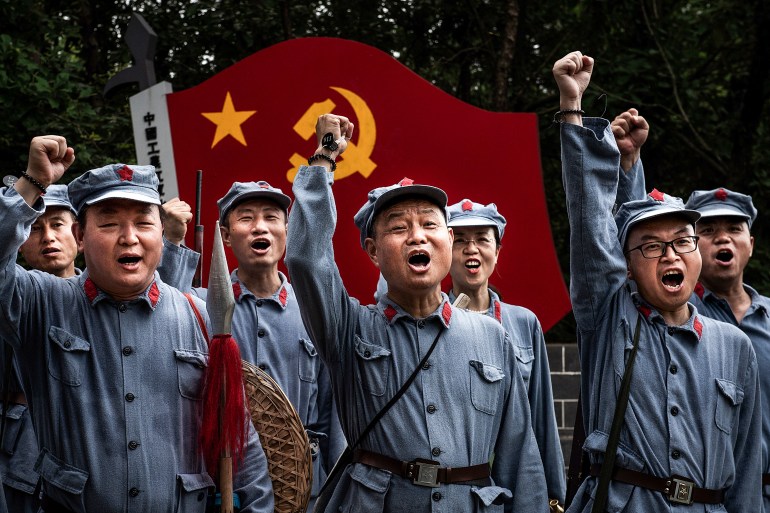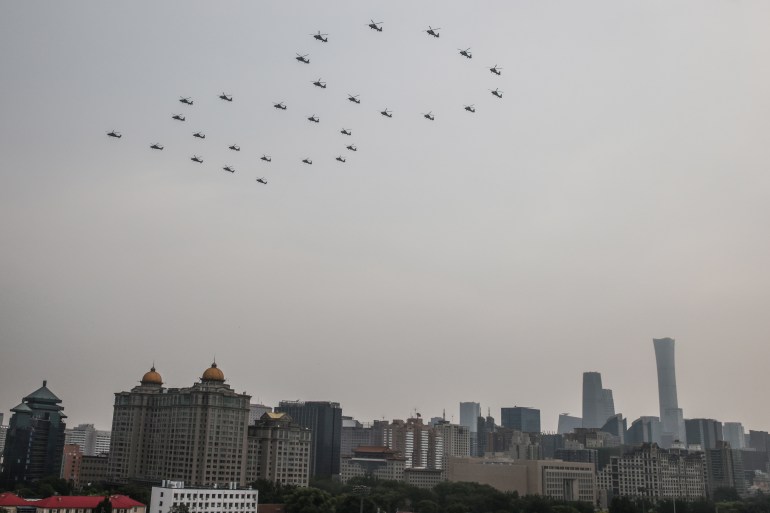Xi says no more ‘bullying’ as China marks party centenary
Chinese president says only the Communist Party could ‘save’ China and that people and party cannot be separated.

Shanghai, China – China’s President Xi Jinping told crowds gathered in Beijing that the era of China being “bullied” was over and that anyone who tried to separate the party and the Chinese people was doomed to failure, as the Chinese Communist Party celebrated its centenary.
Speaking from the balcony above the portrait of Mao Zedong in Tiananmen Square, Xi spoke for more than an hour of the party’s successes since its founding in Shanghai in 1921.
Keep reading
list of 4 itemsChina is threatening academic freedom in Australia, says HRW
Infographic: 100 years of China’s Communist Party
Fewer have confidence in China’s Xi than US’s Biden: Pew survey
In a speech brimming with confidence, accompanied by the party’s senior leaders both past and present, he spoke of how the party had freed China from an “exploitative” feudal system, created a “socialist market economy brimming with vitality” and eliminated absolute poverty.
“Only socialism can save China, and only socialism with Chinese characteristics can develop China,” said Xi, who was dressed in a dark grey Mao-style suit.
The Chinese Communist Party defeated the nationalists in the country’s civil war in 1949 and Mao Zedong declared the People’s Republic of China with the goal of lifting people out of crushing poverty. China is now the world’s second-largest economy and Xi is considered the country’s most powerful leader since Mao Zedong.

The celebrations came with Beijing has under pressure over trade – where tensions have risen with countries including the United States and Australia – and its policies in the far western region of Xinjiang, as well as Hong Kong and Tibet. There are also questions about the COVID-19 pandemic, which emerged in the central city of Wuhan, and continues to cause havoc around the world.
At the head of an increasingly confident party and nation, Xi warned that any attempt to separate the party and the people was “bound to fail”.
While China “welcome[d] friendly suggestions from all around the world”, Xi said the country would not accept “arrogant lectures”.
The loudest rounds of applause and cheering came when Xi said that Chinese people would “no longer allow any alien powers to bully and oppress us”, and that anyone who tried to do so would “be badly battered by the Chinese nation’s perseverance”.
“No one should underestimate the Chinese nation’s will and power to fight against foreign power,” Xi added.
As Xi was delivering his speech in Beijing, social media saw a flurry of celebratory posts.
The landing pages of nearly all social media platforms featured meticulously designed celebratory posters; in WeChat Moments feed, roughly the equivalent of Facebook’s news feed, people posted congratulatory messages and photos, with words such as “happy birthday – our great CCP”; and on Weibo, China’s Twitter-like social media platform, the CCP centenary topics swept across the trending topic list, with the topic #CCPTurns100Today garnering more than five billion views.
‘We can do anything!’
The centenary celebrations in Beijing began with a flypast as about 30 military aircraft formed a “100” in the skies above the cheering crowds. There were also trumpets and horns blasting communist songs, and 100-gun salutes fired into the sky in extravagant celebrations of national pride.

At airports and train stations, on billboards, on posters and propaganda materials across television and social media, China has been turned the red of the Communist party.
In northwestern Gansu province’s Longnan, a transit spot for the Chinese Communist Party fighters during the Great March of 1934, party flags were hung on the roof of each household and large statues of the hammer and sickle erected weeks before July 1.
The town has become a popular spot for ‘red tourism’.
“We are all proud party members and we wanted to come here to pay tribute to the older generation of revolutionaries,” Ms Guan, a party member from Shan’xi told Al Jazeera as she posed for a photo with a group of other party members in a tour of the town in front of a giant hammer and sickle.
Longnan is not the only town celebrating the country’s governing party’s birthday.
The entire nation has been mobilised to observe the day – from the giant city of Shanghai where the CCP was founded and the first party congress convened – to small towns in Xinjiang where Beijing has been accused of suppressing the rights of the ethnic minority Uighurs.
Despite the general mood of exuberance, there have been some complaints that the preparations for the event have obstructed daily life. Special security checks were installed for Beijing-bound travellers ahead of the celebration, roads surrounding Tiananmen were closed for days, and police and paramilitary forces stationed in nearly all corners of the city.
Wu, a Shanghai-based music concert gaffer, said that nearly all of her freelance gigs had been called off throughout June and July because of the “special period of time” that requires “vigorous control over what could be allowed”.

“I don’t really care about the celebration, but I’m OK with it – but at least they shouldn’t cancel so many music festivals and concerts,” said Wu, who requested anonymity. “I don’t understand how that’s sensitive.”
For Fu, a photographer based in Anhui province, the heightened restrictions meant he was unable to buy a drone, affecting his work. Since June 11, all online platforms have been required to take recreational drones off the shelf for “relevant regulating requirements,” and the measures will remain in place until July 15.
“I have gotten used to this sort of unnecessary and sometimes ridiculous measures,” Fu said, requesting to be only identified by a pseudonym. “I just hope I could buy drones soon so I could resume my work.”
For the governing party, however, the effort is worth it.
For China’s leaders, the real challenge still lies overseas where Beijing faces mounting criticism and scrutiny not only over Xinjiang but also Hong Kong, where it has been accused of decimating rights and freedoms that were guaranteed when the territory was returned to Chinese rule in 1997.
On the mainland, however, the Communist Party appears to be garnering an almost unprecedented level of praise and loyalty.
“Without the Communist Party, there would be no new China,” a famous Communist Party song goes. A century after the party was founded, it is a sentiment that appears to be widely shared among the Chinese populace, whether party members or not.

Data released on Wednesday, showed party membership increased by 2.43 million last year, the biggest rise since Xi became president in 2013.
“I’m so proud of being a party member, and I’m so proud of being a Chinese,” one Weibo user commented during the livestream of the celebration on Tiananmen Square. “Under the leadership of CCP, we can do anything!”